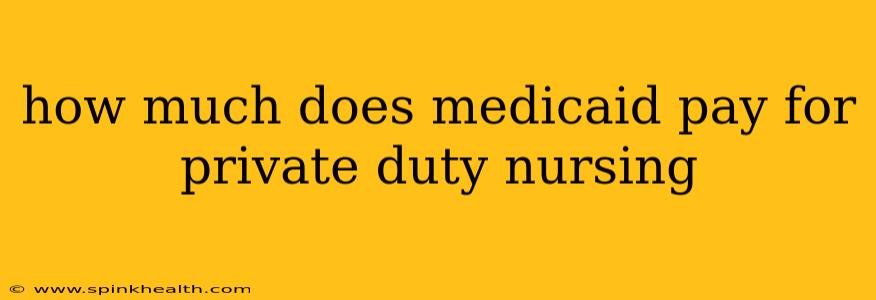How Much Does Medicaid Pay for Private Duty Nursing? A Deep Dive into Coverage and Costs
The world of healthcare funding can be a maze, and understanding Medicaid's coverage for private duty nursing is no exception. The short answer? It varies wildly. There's no single national rate; coverage depends heavily on your state, your specific needs, and your Medicaid plan. Let's unravel this complexity together.
Imagine this: Sarah, a recent stroke survivor, needs around-the-clock care to regain her independence. She relies on Medicaid, her lifeline to essential healthcare services. Her journey to securing private duty nursing through Medicaid highlights the challenges and nuances involved.
What is Private Duty Nursing?
First, let's clarify what we mean by "private duty nursing." It's personalized, one-on-one care provided by a registered nurse (RN), licensed practical nurse (LPN), or certified nursing assistant (CNA), tailored to an individual's specific medical needs. This contrasts with nursing in a hospital or nursing home setting. Private duty nursing can encompass a wide range of tasks, from medication administration and wound care to assistance with daily living activities.
Medicaid's Role: The State-by-State Reality
Medicaid, a joint federal and state program, leaves much of the decision-making regarding private duty nursing coverage to individual states. This creates significant disparities across the country. Some states readily cover private duty nursing, while others impose strict limitations or require extensive documentation proving medical necessity.
What Factors Influence Medicaid's Payment?
Several crucial factors dictate how much Medicaid pays for private duty nursing:
-
State Medicaid Agency Policies: As mentioned, each state sets its own rules and reimbursement rates. These rates can vary considerably based on the state's budget, healthcare priorities, and the complexity of the individual's needs.
-
Medical Necessity: Medicaid doesn't automatically cover private duty nursing. You'll need thorough medical documentation demonstrating the necessity of this level of care. This often involves a physician's order outlining specific needs and justifying why other care settings aren't suitable.
-
Level of Care: The type of professional providing care (RN, LPN, CNA) significantly impacts costs. RNs generally command higher rates than LPNs or CNAs. The complexity of the required nursing care also plays a major role. Intensive care needs, such as ventilator management, translate to higher costs.
-
Hours of Care: The number of hours of care needed directly affects the total cost. Around-the-clock care, naturally, costs far more than a few hours daily.
How to Find Out Your State's Coverage
Navigating this process requires research. The first step is to contact your state's Medicaid agency directly. Their website will often have information about private duty nursing coverage, including application procedures and contact information for further inquiries. Don't hesitate to call – their staff can clarify specific rules and provide personalized guidance.
Beyond the Basics: Additional Questions to Consider
While we've addressed the core question, here are some related concerns many individuals have:
1. What documentation is needed to apply for Medicaid-funded private duty nursing? This typically includes a physician's order, a comprehensive assessment of the individual's needs, and possibly supporting documentation from therapists or other healthcare professionals. Specific requirements vary by state.
2. Are there waiting lists for Medicaid-funded private duty nursing? Waiting lists are possible, depending on the state, the availability of nurses, and the demand for services. This is another reason to contact your state's Medicaid agency promptly.
3. Can I choose my own private duty nurse through Medicaid? This varies by state. Some states offer choices, while others contract with specific agencies.
4. What happens if my Medicaid coverage changes? A change in Medicaid eligibility could affect private duty nursing coverage. Staying informed about policy changes is crucial.
In conclusion, there's no simple answer to how much Medicaid pays for private duty nursing. The journey to secure this essential service necessitates understanding your state's specific regulations and proactively engaging with your state's Medicaid agency. Remember, thorough preparation and persistent communication are key to navigating this often complex process successfully.

